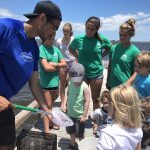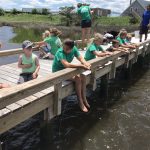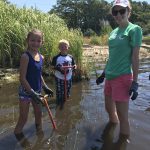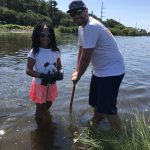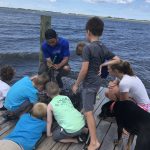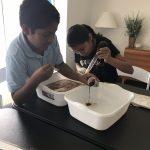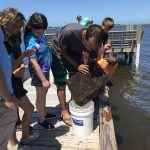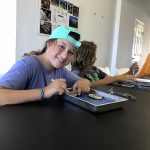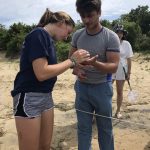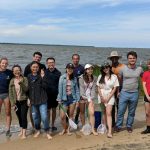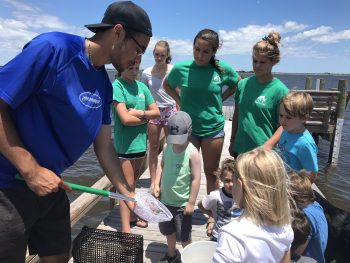
Jennette’s Pier
Even though school is out for summer, the North Carolina Coastal Federation staff in the northeast has been hosting a variety of community groups at their office and in the field for hands-on learning.
Jennette’s Pier came by the office with some of their youngest summer participants of their “Small Fry” camp. The tiny campers learned about ways that the estuaries can become polluted and the important message of working together to be sure it stays clean. They tested their observation skills with a scavenger hunt along the office’s shoreline. They explored the dock, checked for any crabs or fish in the pots set in the water and then tried their luck with some line crabbing. They were successful at luring several crabs in with raw chicken as bait. After the excitement of viewing the crabs, all critters were released unharmed.
Dare County 4-H and Camden County 4-H groups spent the day with the federation in a “Dunes to Marshes” program. After helping with marsh grass plantings and doing some seining at the Moor Shore Road living shoreline, the group visited the Wanchese office where the fun continued. They learned about sources of pollution through a matching activity and realized that though many pollutants can harm the waterways, we can take positive actions to keep the habitats healthy. They took a closer look at some of the animals that call the estuary home, including the importance of the juveniles that grow up there. They also strolled the dock to examine some of these living specimens up close, including juvenile fish, crabs and even oysters.
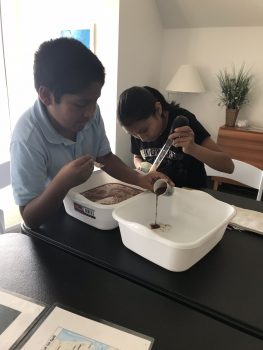
Sea Change Partnership
A small group of middle school students from Sea Change Partnership spent the morning at the federation’s office. Sea Change Partnership works with the Outer Banks Latino community to promote education and encourage cross-cultural understanding. This group tested their skills of cleaning up an oil spill, with a simulation in a dish pan, using tools that replicate actual cleanup methods. They then discussed the benefits and challenges that would arise with exploring for oil off our coast. To understand ways that nature has natural filters to provide water quality protection, they also did an oyster dissection. Exploring the internal organs of local oysters shows their value and importance of filtering water and helping protect our shorelines. Having these experiences helps shy students gain confidence in challenging subjects like science. A group of campers from the North Carolina Aquarium also spent an afternoon at the Wanchese office where they learned all about oysters and participated in an oyster dissection.
Outside the office, the federation took a group of international college students on an exploration of the living shoreline at Jockey’s Ridge State Park. The students are spending the summer working at Food Lion on the Outer Banks and they took some time to learn more about the ecosystems thanks to the trip coordinated through Alliance Abroad Group. The students are from various countries, including China, Thailand, Turkey and the Dominican Republic, and were excited to see the small crabs, fish, shrimp and oysters in the estuary. A student from Turkey explained they often eat oysters with cooked rice and highly recommended trying that combination.
“[This trip] was absolutely wonderful. Thank you so much to [the federation] team. The students had an absolute blast and learned so much. I knew it was going to be a great event, but it exceeded my expectations,” shared Sierra Williams, outreach coordinator with Alliance Abroad Group.
More photos from the groups:

